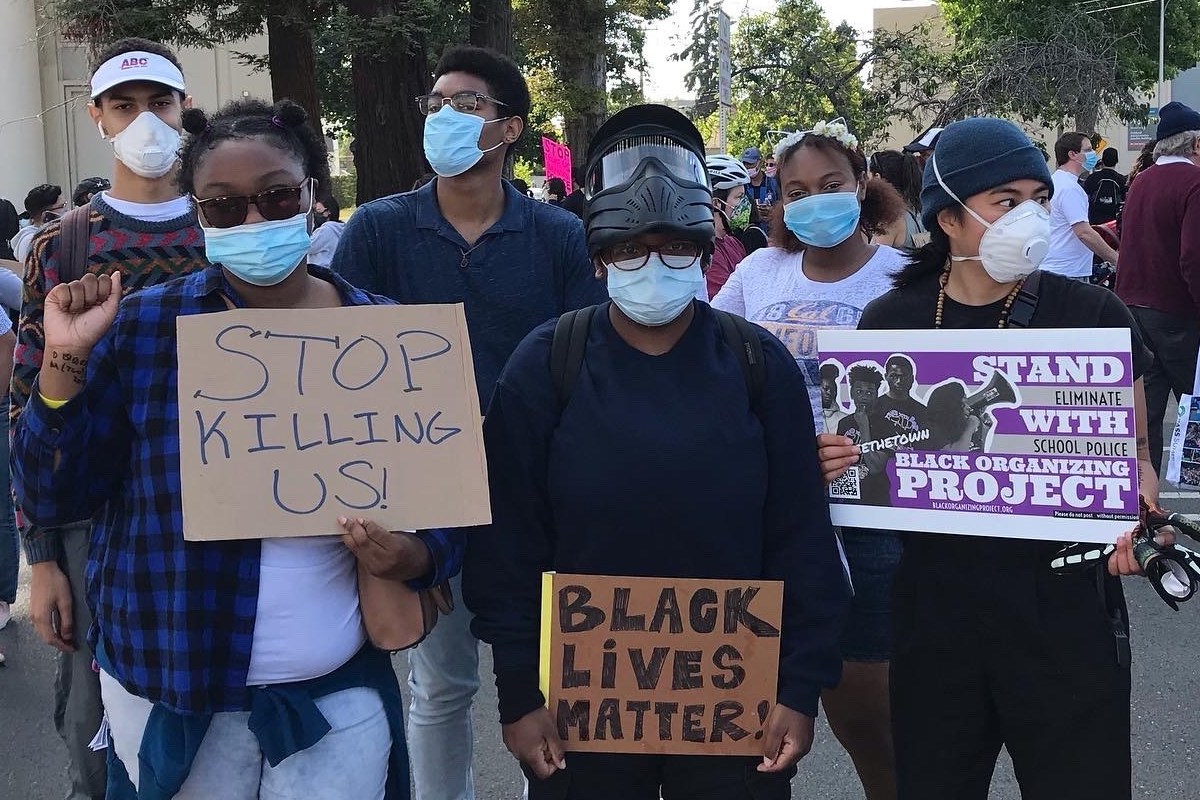The three Black members of the Oakland Unified School District’s board of education introduced a sweeping proposal last week that calls for reparations for Black students in the district, echoing a national call to address centuries of slavery and institutionalized racism against Black Americans.
The goal of the legislation is to protect Black schools from closure, target more money and resources to Black students’ needs, focus on increasing Black students’ academic performance, and to hire and retain more Black educators.
“We have failed our responsibility to our Black students,” said District 3 Director VanCedric Williams, who introduced the measure. “We have a segregated school district and OUSD has a responsibility to protect Black students from systematic racism.”
The resolution points to years of under-investment, under performance, school closures, gentrification, and other disparities that disproportionately harm Black students in OUSD, leading to a considerable drop in their enrollment numbers—from nearly 50% of OUSD students during the 2000-2001 school year to about 22% of students today, or a decline from about 25,600 students to 11,700 students, according to district and state data.
Supporters of the resolution want to see it passed in February to honor Black History Month, but at last week’s meeting, board president Shanthi Gonzales said that evaluating the financial implications of the policy could take longer, therefore it may not come back to the board until March.
Since the legislation was being introduced for the first time, the board did not discuss what’s in the policy. When it comes back to the board in February or March for a first reading, board members can ask questions or make suggestions, and the policy’s authors can incorporate changes before bringing the policy back for a vote in the meeting after that. The resolution was co-authored by District 5 director Mike Hutchinson and District 7 director Clifford Thompson.
“The three of us Black school board members do not agree on everything, and have different policy ideas and different personal politics, but we are united in supporting the call for Black sanctuary and Black reparations,” Hutchinson said in an interview with The Oaklandside.
Reparations for Black Americans have typically been discussed in the form of money or land from the federal government as compensation for enslavement and Jim Crow laws that deprived Black people from being able to create or preserve wealth, while enabling that for white Americans. This created wealth disparities seen today. While reparations directly from school districts have had less discussion, school districts have also been architects of school segregation and other racist policies that harm Black students, which lead to unequal outcomes.
“These students are owed a quality education and you have to fund it,” said Kampala Taiz-Rancifer, a teacher and member of the Oakland Education Association executive board, in an interview with The Oaklandside. “In this moment, when issues of race and racism are in the forefront, we know that our opportunity is now to ensure that our students get what they need.”
The idea for the legislation came from two years of listening sessions held by the Justice for Oakland Students Coalition, to learn what Black students, families, and teachers were experiencing in the district, Taiz-Rancifer said. Justice 4 Oakland Students is made up of a group of Oakland community organizations, including OEA, Oakland Kids First, the Black Organizing Project, Californians for Justice, and others.
Some of the more urgent initiatives in the proposal are tied to the COVID-19 pandemic and would direct the superintendent to create an emergency fund for Black families to help them pay rent, so that students have a stable environment to focus on their work, and to prioritize Black students for Chromebook and hotspot distribution.
Another aspect of the policy would designate specific OUSD schools whose Black student population is more than 30% of the school’s total enrollment as “Historically Black” and would protect these campuses from being closed. Over the past decade, OUSD has closed several schools as part of its Citywide Plan, a strategy to address budget shortfalls by reducing expenses associated with maintaining and staffing school campuses. In 2012, Oakland Unified closed four schools that each had Black populations of more than 55%. Roots Middle School, which was closed in 2019, had a Black population of about 33% and would have fallen into the Historically Black School category.
“We need to stop school closures that are often targeted at schools with large populations of Black students. We need to recruit, develop, and retain Black educators and create safe working environments for our members. And we need to close the Black digital divide,” Taiz-Rancifer said during the meeting.
Several parts of the reparations proposal ask the superintendent to examine Black students’ academic performance and literacy rates, which have historically been lower than other groups, a pattern known as the achievement gap. It would require schools with more than 10 Black students enrolled to show continuous academic improvement, and provide extra support to Black students who need help with academic credit recovery, social and emotional development, and job training.
Under the plan, OUSD would create a task force by March 31 made up of Black students, teachers, and community members, to oversee the implementation of the policy, and would establish a Black Thriving Fund to support all of its new initiatives. The money would come from the state and national funds that OUSD receives for having higher percentages of low-income students, foster students, homeless students, and other high-needs youth.
Many community organizations in Oakland have endorsed the legislation, including the Anti Police-Terror Project, the Oakland Education Association, and the Black Organizing Project, which was responsible for the George Floyd Resolution that disbanded the school police department last year.

